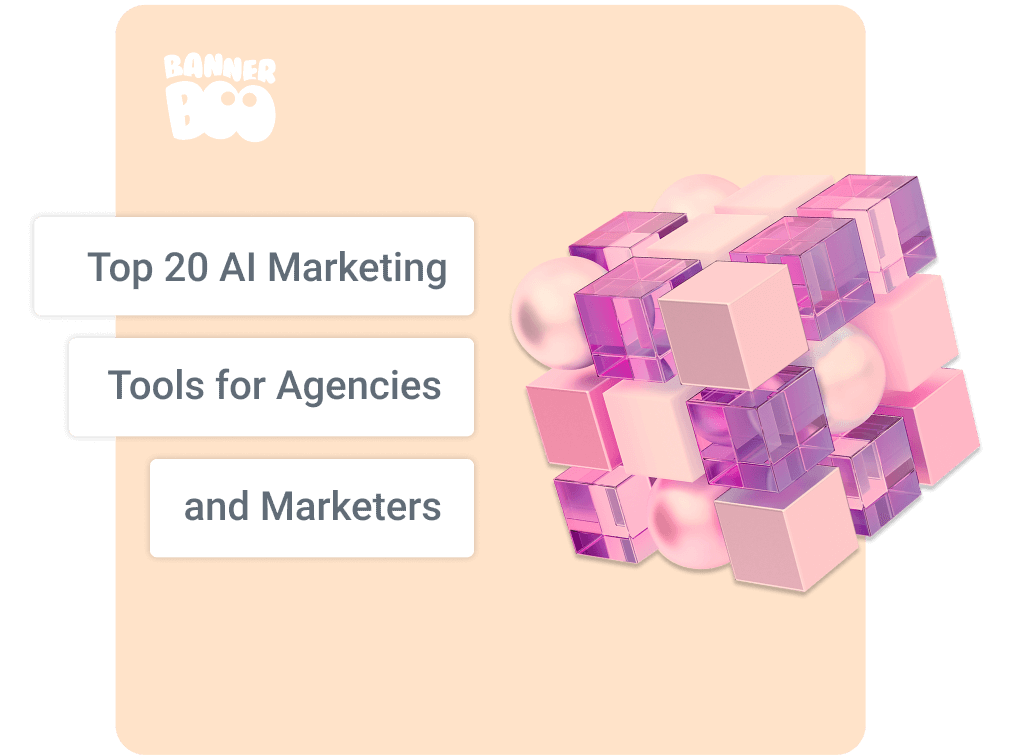
Agree, the past few years have completely reshaped the conventional approach to working with content, video, photos, and graphic materials. AI marketing tools are transforming the industry right now and are predicted to experience remarkable growth in the future. To avoid being left behind by these trends, we recommend integrating AI into your business today. How exactly? It doesn't matter—there are solutions for any marketing challenge: handling customer support inquiries, creating personalized offers, writing emails, automating administrative tasks, and analyzing consumer data. Start now to change the trajectory of your brand's development tomorrow!
The AI solutions industry is evolving at an extraordinary pace. Just yesterday, it seems, we were witnessing the tentative steps of ChatGPT generating phrases and simple dialogues. Today, AI solutions not only handle routine tasks but also completely replace entire categories of professions. In 2025, artificial intelligence is no longer a luxury or novelty. It is an essential tool in the arsenal of marketers and agencies striving to remain competitive and take businesses to new heights.
The undeniable advantage of AI solutions lies in their ability to analyze massive datasets in real-time and automate routine, repetitive tasks. This frees marketing teams from manual work, providing more room for creativity and strategic planning. Moreover, some tasks fall outside the scope of economic feasibility. For instance, a marketer simply cannot spend weeks analyzing competitors' activities to develop an effective strategy—it’s too time-consuming. As a result, strategies are often based on data from key competitors. However, focusing only on key competitors means missing out on the full market dynamics, and some data will inevitably be lost.
Why is this important?
Firstly, to avoid missing an opportunity. If you are not yet using AI, your competitors might adopt it sooner. They could have more ads, more strategies, and gain recognition thanks to automated strategies for content creation and promotion.
Secondly, let’s agree that traditional marketing methods no longer work in their "pure form." They have been replaced by mixed, diverse, and more complex strategies. AI, by analyzing large datasets of market trends, can guide you on where to start or even completely change your approach for your business niche.
Whether it’s about precise targeting for the ideal audience, optimizing ad spend, or creating viral content, the use of artificial intelligence can have a critical impact on the success of a campaign.
Moreover, key AI tasks in marketing include:
Predicting outcomes based on real data (AI analyzes consumer behavior, market trends, and campaign performance faster and more accurately, providing supporting data for each hypothesis).
Personalization and unification (a trend of 2024, which is here to stay: creating ads that clearly and concisely solve the problems of specific representatives of the target audience).
Enhancing service and improving loyalty (by selecting solutions for each case based on market experience, AI can propose strategies that completely transform your relationship with customers—for the better, of course!).
Automating tasks and reducing errors (delegating repetitive tasks to AI—those where the likelihood of making a mistake is highest—saves time and resources for addressing critical issues).
So, the advantages are clear. But how do you choose the AI tool that will best address your needs? Let's dive into the details!
To achieve the right results, the right tools are essential. What determines their effectiveness so that out of hundreds of solutions, only a few make it to our list?
There is a whole list of criteria, among which our team considers the following to be the most important:
Every new tool should simplify work, not complicate it. If you're working alone, that's one thing, but if you have an entire team of specialists, a new tool can completely reshape business processes, which is always stressful. Choose tools with an intuitive interface, minimal training time, and clear implementation instructions. It should be convenient for everyone: large agencies, freelancer teams, self-employed individuals, or small businesses.
We understand that it's hard to predict the full range of business areas where AI can be applied at the beginning of implementation. However, marketing and its needs will undoubtedly evolve with the growth of a company. AI tools should meet the needs of individual marketers managing small companies as well as agencies handling complex business processes for multiple clients. Scalability ensures that the tool remains relevant as tasks grow.
Financial viability is a critical factor for both individual marketers and agencies. To be included in the list of top AI tools, the following are necessary:
Accessibility and functionality;
Various pricing plans that ensure a balance of cost and value;
Availability of a trial period and an explanation of the tool's development plans.
Finances play a key role, as companies evaluate results and resource savings (or the ability to complete more tasks in the same amount of time) to make decisions about changes and improvements.
The range of tasks an effective AI tool should address includes (based on search criteria):
Analytics based on statistical data (including real-time analytics);
Automation capabilities (e.g., email campaigns, social media posts, ad bid adjustments);
Creative content generation (e.g., writing copy or ads, keyword selection, image and video editing, etc.).
Additionally, an effective AI tool should support full or partial integration with existing platforms (CRM, social media dashboards, ad managers) to improve usability.
Reputation always matters, especially for new tools. Analyze data from search engines, carefully read reviews from real clients, and, if possible, ask actual users for their impressions. Consider everything: engagement levels, increased conversions, or reduced operational costs. These insights can influence whether the AI tool is reliable, effective, and supported by a responsive customer service team.
Based on these and other criteria, we have compiled a list of 20 AI tools that meet the diverse needs of marketers in 2025.
Choose your query: content generation, social media growth, competitor analysis, SEO scaling, or improving email campaigns, and start working right away.
These tools will help you achieve your goals efficiently and effectively!
We have categorized all the tools according to the types of tasks they perform. Of course, the final decision is yours, but these recommendations will definitely help you select the key AI tools for further comparison.
The main purpose of these tools is to generate high-quality content, both textual and visual, to optimize a marketer's workflow. With AI, you can create blog posts, ad copy, website banners, or social media posts. Save time and resources without compromising on quality and creativity.
Jasper AI (jasper.ai)
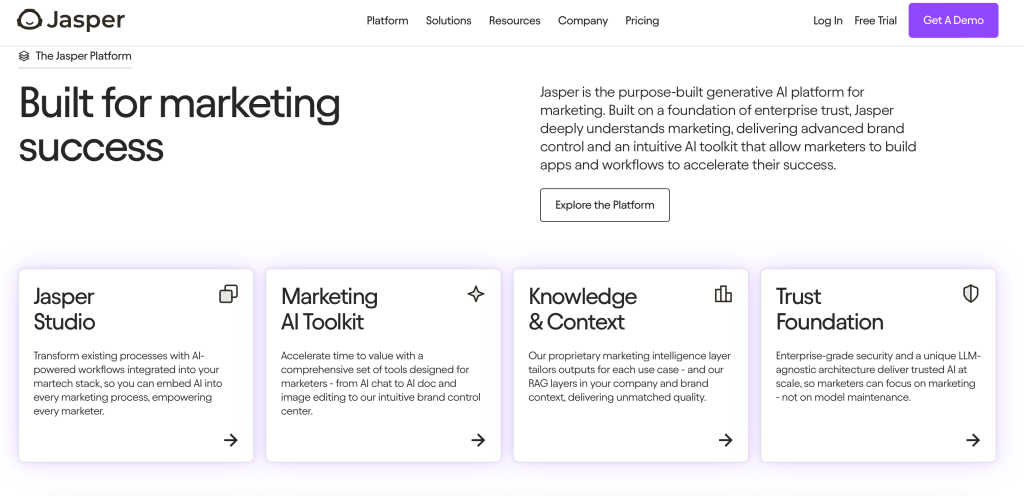
A service that creates engaging marketing content: from blogs to ad copy. You have access to over 50 templates for any marketing task, including landing pages, emails, ads, and blog posts. Fonts and more than 80 languages are also available. Jasper uses your brand's tone of voice and style to generate relevant content.
We recommend starting with Jasper's free trial, and to unlock all the essential features, you can choose one of their plans: Creator, Pro, or Business.
BlogAssistant (blogassistant.co)

BlogAssistant operates on the advanced Nostradamus.cloud engine, GPT-4, and PaLM2, offering marketers a top-tier AI tool for writing articles that AI detectors cannot identify. You can select the article length, add SEO-friendly keywords, and include images—all at an affordable price per blog. The tool delivers plagiarism-free content that cannot be detected by any AI detection tools. It is an excellent choice for marketers looking to save time and create truly high-quality content with the help of AI.
Copy.ai (copy.ai)
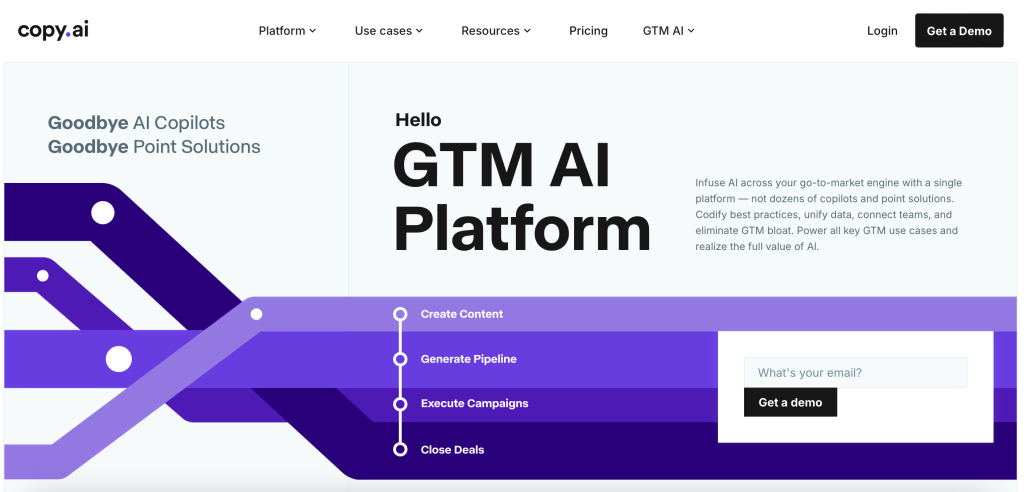
Copy.ai is a reliable assistant for creating texts. It helps save time and makes content more professional and tailored to business needs.
Key features include generating multiple versions of a single text in different tones (formal, creative, friendly, etc.) and a wide range of tools for enhancing existing text: editing, shortening, or adapting it to the target audience's needs.
Copy.ai offers a free plan with basic features (a limited number of queries) and paid subscriptions. It’s ideal for marketers, content creators, entrepreneurs, and anyone who wants to quickly generate ideas or produce high-quality written content.
How can AI help a marketer here? Of course, with planning and creating publication content, analyzing engagement, and optimizing posts and stories for better interaction metrics.
Youscan.io (youscan.io)
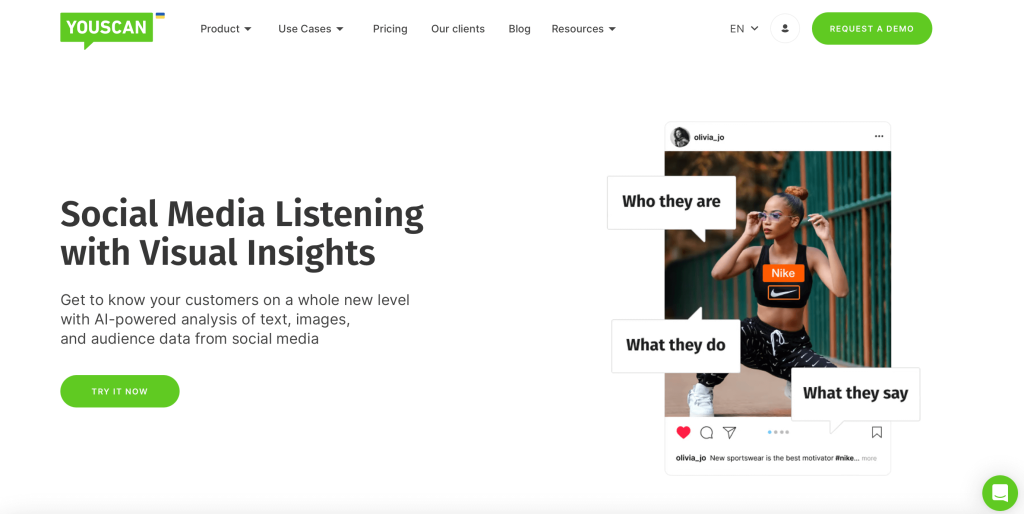
YouScan.io is a modern platform for monitoring and analyzing brand mentions online using AI. Marketers use the service to track feedback, assess brand reputation, and analyze audiences on social media, forums, blogs, and other open sources. It's an ideal choice for those who want to stay connected with their audience and actively manage their online reputation.
YouScan offers several subscription tiers depending on user needs, ranging from basic monitoring to advanced analysis with AI and visual data. Pricing is tailored to the number of keywords, sources, and other parameters.
Hootsuite (hootsuite.com)

Hootsuite is one of the most popular platforms for managing social media, fully covering tasks such as planning, publishing, analyzing content, and engaging with the audience. It supports numerous platforms, including Facebook, Instagram, Twitter, LinkedIn, TikTok, and YouTube, and can be integrated with CRMs, email marketing systems, analytics platforms, and more. Hootsuite is suitable for both small businesses and large companies, ensuring efficient coordination of a brand's presence across various social networks.
Several subscription options are available: a free plan (with limited functionality) or paid plans that offer support for multiple social networks, analytics, and team collaboration with different users.
Buffer AI (buffer.com)
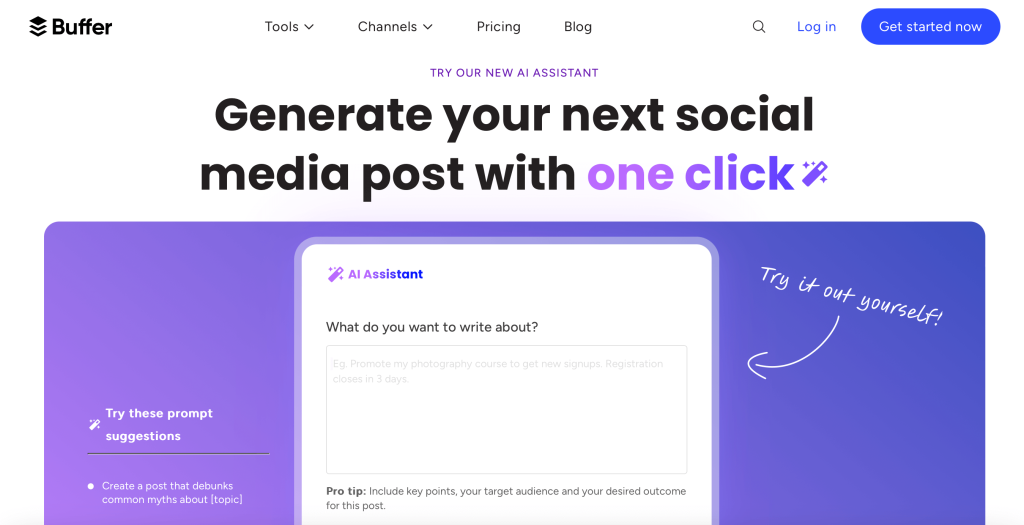
Buffer AI is an extension of the Buffer platform that uses artificial intelligence to create, optimize, and analyze content for social media. While Buffer manages networks, AI focuses on enhancing content efficiency and automating workflows. The most popular features include:
Buffer AI is ideal for those who want to automate content creation while maintaining high quality and brand consistency. Thanks to AI capabilities, every user can achieve more results with less time and resources.
A detailed understanding of the target audience is the key to successful marketing activities. Based on an understanding of customers and their needs, businesses develop growth strategies. It is crucial to identify patterns in customer behavior, predict trends, and make decisions based on real data rather than hypotheses.
Wantent.io (wantent.io)
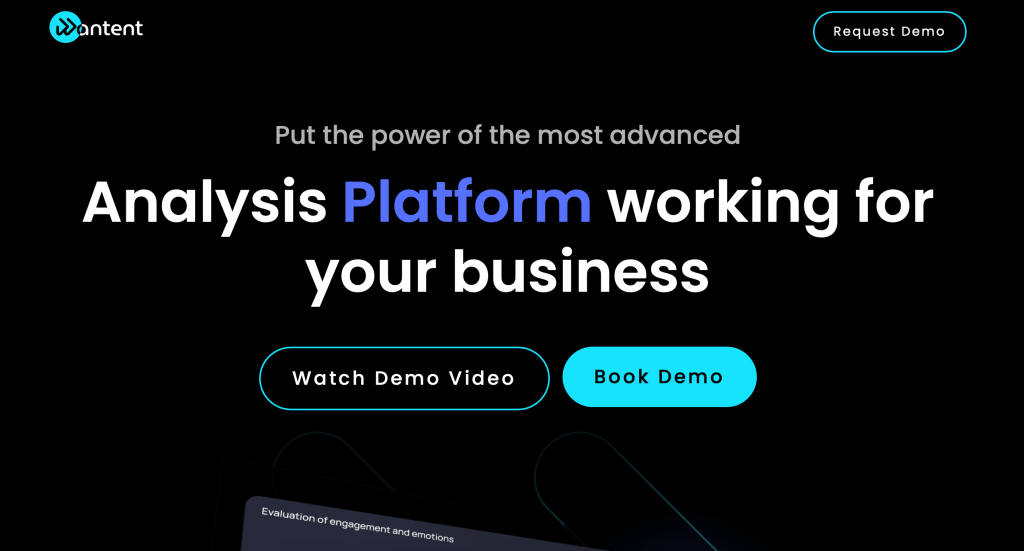
Wantent.io is a platform for video content analysis that uses artificial intelligence to assess emotional impact, audience engagement, and video effectiveness. The service helps companies understand how their content resonates with viewers and optimize it to achieve marketing goals. This enables brands to focus on creating videos that leave a strong emotional impression and effectively drive traffic to their website or social media channels.
This marks a new stage in developing marketing strategies based on interaction and engagement metrics analysis.
HubSpot (hubspot.com)
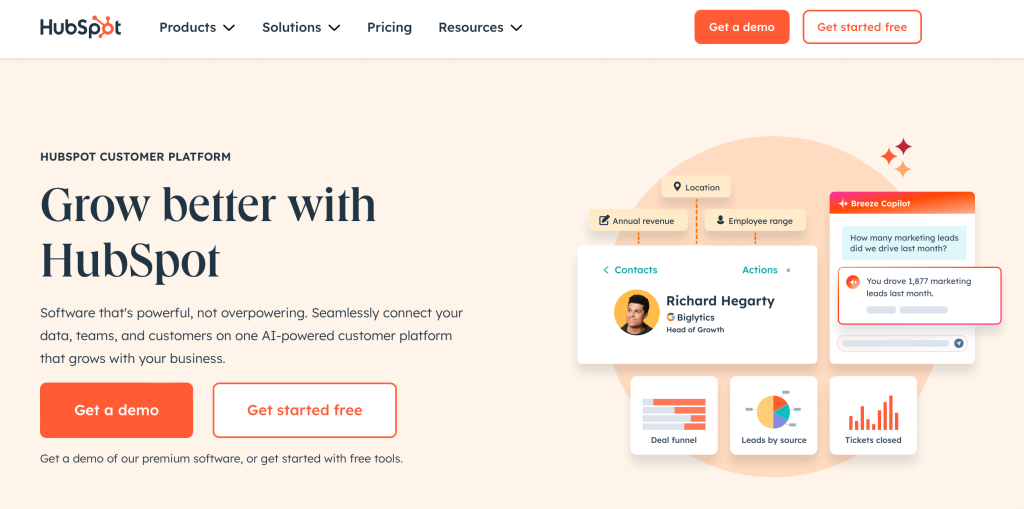
HubSpot combines CRM with AI-based analytics to track the customer journey and personalize interactions at every step. It allows businesses to automate marketing, sales, and improve customer service, helping them attract, engage, and retain their audience.
HubSpot is a comprehensive ecosystem for building effective communication with customers. The platform is user-friendly and straightforward, offering a wide range of tools and features, making it the choice of millions of businesses worldwide.
Zoho Analytics (zoho.com)
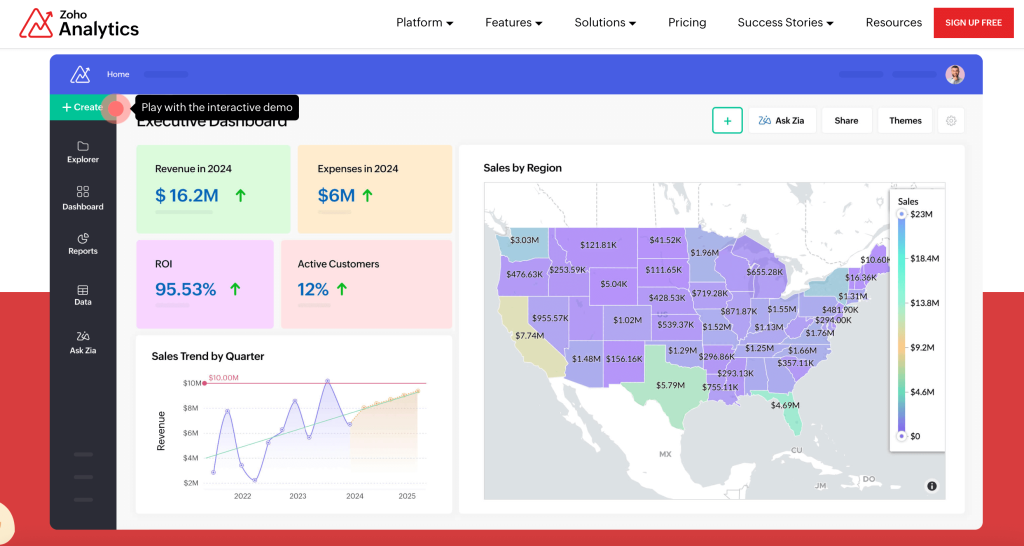
Zoho Analytics is a business analytics platform that allows users to create interactive reports and dashboards for data analysis. With integration options for numerous services, including CRM, marketing platforms, and other data sources, Zoho Analytics helps businesses understand customer behavior and optimize processes.
Pricing plans include Free, Basic, Standard, Premium, and Enterprise. Features vary depending on the number of users and the volume of data required for analysis.
Imagine that instead of constantly analyzing ad accounts, you can assign a task to a service, and it will study the data, reformat ineffective ad sets, optimize budgets for successful creatives, and at the end of the month, generate analytics for client presentations. Magic? Not at all—this is reality with AI.
Adzooma (adzooma.com)
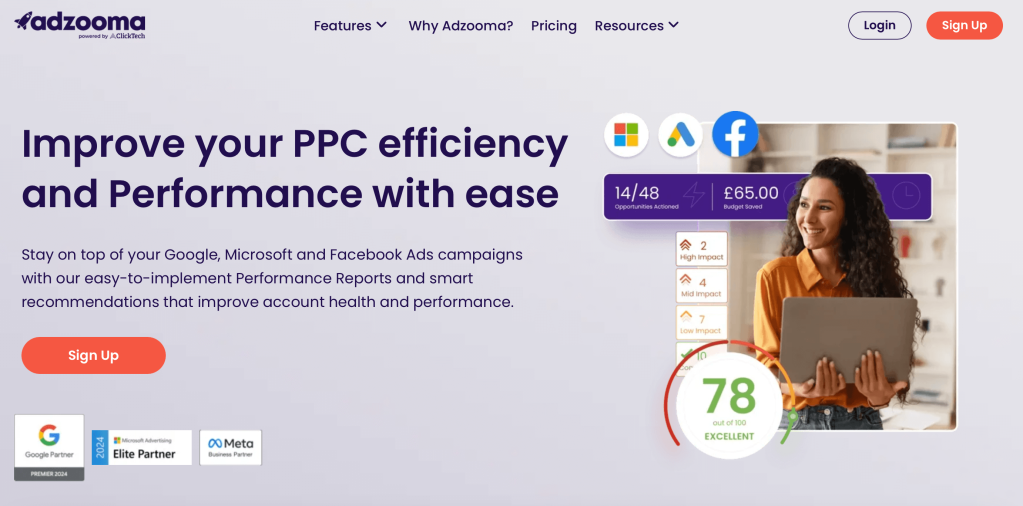
Adzooma is a platform for managing paid advertising that helps businesses optimize and control their ad campaigns on Google and Meta Ads. Using AI-powered tools, the service provides personalized recommendations and automated solutions to enhance ad performance. Adzooma offers several subscription plans, including a free option with basic features. Paid plans provide additional capabilities such as weekly or daily reports, unlimited users, and branded reports.
Adzooma is suitable for small and medium-sized businesses as well as digital marketing agencies seeking effective tools for managing paid advertising. The platform is continuously updated and improved to meet user needs.
AdCreative.ai (adcreative.ai)
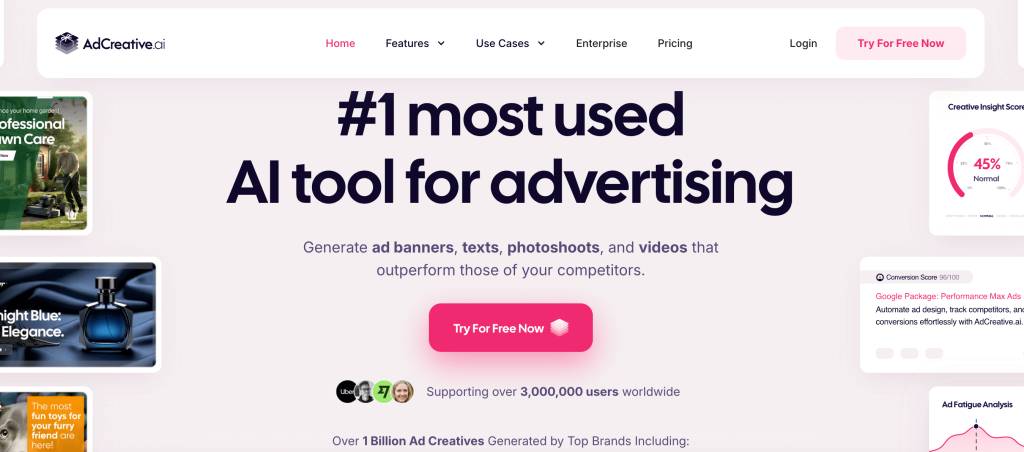
AdCreative.ai is a platform that uses artificial intelligence to automatically create advertising materials, including text, ads, calls-to-action, and links, along with additional features to enhance the effectiveness of advertising campaigns. AdCreative.ai allows users to study competitors' ad campaigns, helping them stay ahead in the market. Additionally, it can evaluate ad materials before launch, providing recommendations for improvement.
BannerBoo (bannerboo.com)
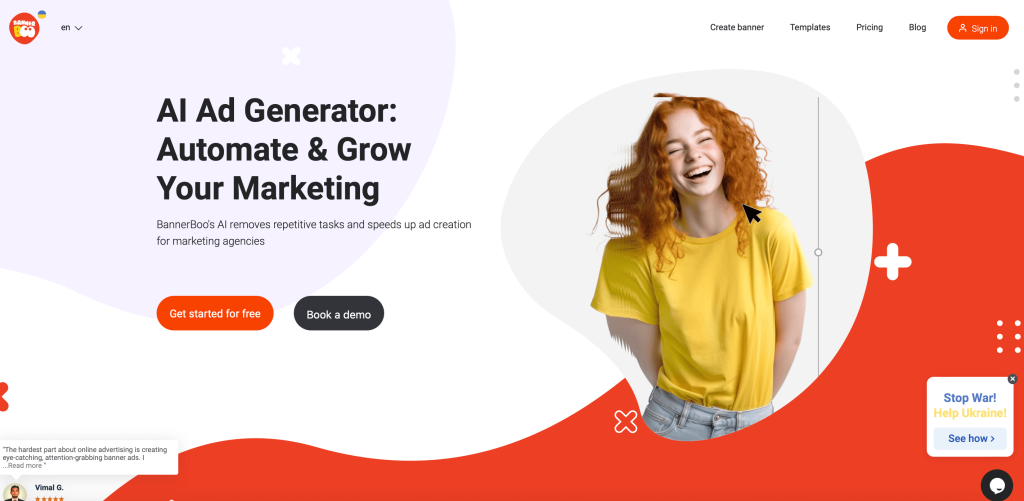
BannerBoo is an AI-powered service for creating animated banners and ads for various platforms. Thousands of users create professional and eye-catching banners without design or coding skills. Its undeniable advantages include a user-friendly drag-and-drop interface and over 80,000 ready-made templates tailored to 30+ business industries and any placements. Completed designs can be saved in popular formats such as GIF, HTML5, MP4, or static JPEG and PNG. We recommend starting with the basic plan, which can be upgraded at any time to unlock even more features!
Revealbot (bir.ch)
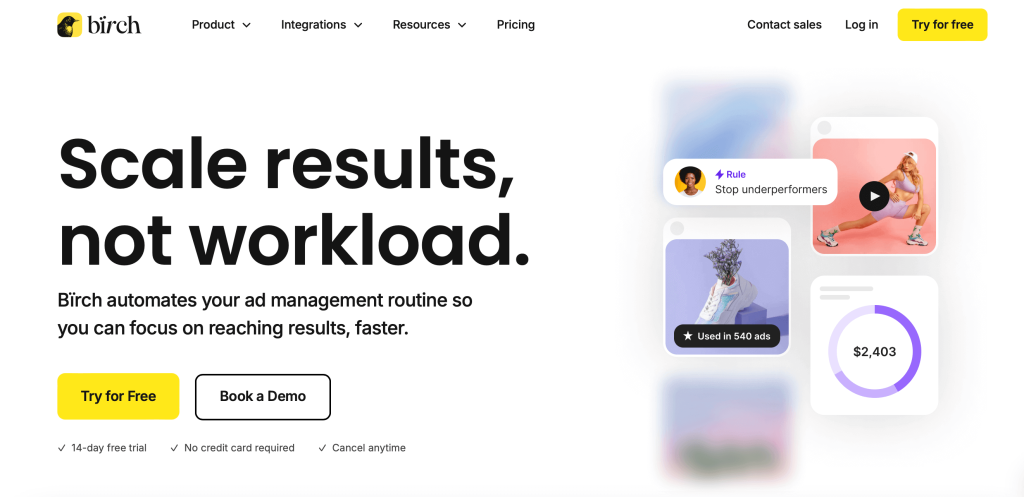
Revealbot automates the testing and scaling of ads on Meta Ads (Facebook and Instagram), Google Ads, Snapchat Ads, and TikTok Ads. It also integrates with analytics and communication tools, including Google Sheets, Google Analytics, and Slack.
Using AI strategies, the service can create (including A/B testing strategies), configure automated rules for optimizing budgets, and enhance the effectiveness of advertising campaigns.
Revealbot offers various subscription plans with limits on monthly ad spend. If your spending exceeds the selected plan’s limit, additional fees will apply.
The work of these services is focused on optimizing marketing efforts and achieving better results with less time and resource investment. All these activities enable brands to be more efficient and enhance customer engagement through personalized and timely messaging.
Mailchimp (mailchimp.com)

Mailchimp automates email marketing and allows businesses to create, send, and analyze promotional emails and campaigns. The platform provides a wide range of tools for content creation, audience segmentation, and performance analysis. It's an ideal platform for small and medium-sized businesses.
Mailchimp is incredibly user-friendly: even beginners can easily create effective campaigns, with everything from analysis to automation in one place. It offers many free features, allowing users to start at no cost and add new functionalities as their business grows.
ActiveCampaign (activecampaign)
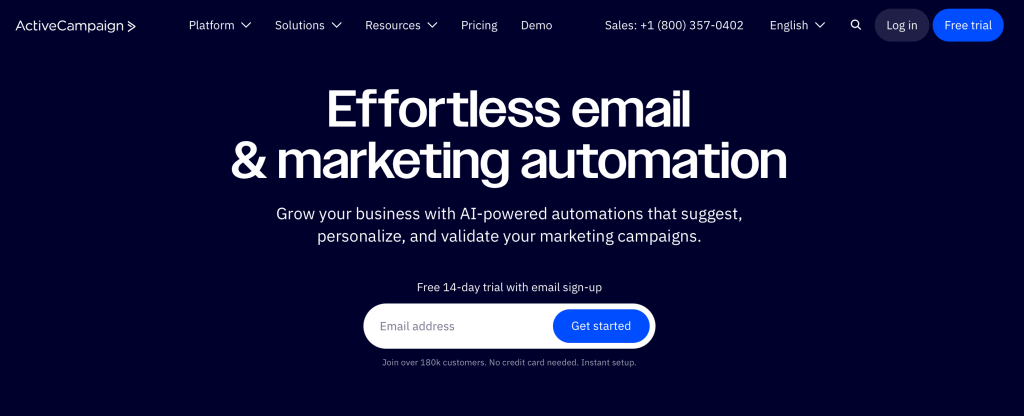
ActiveCampaign is a professional platform for marketing automation and customer relationship management (CRM) that helps businesses create personalized and automated marketing campaigns. It combines email marketing, sales automation, contact management, and analytics features, enabling effective interaction with customers at all stages of their journey. A free 14-day trial is available for exploration. Additionally, ActiveCampaign provides extensive learning resources for users, including webinars, training courses, and a supportive technical community. It’s an excellent opportunity to dive into complex tasks with ease.
Brevo (ex Sendinblue) (brevo.com)

Brevo (formerly Sendinblue) is a marketing automation platform for creating, launching, and analyzing email campaigns. It also supports SMS marketing, chat, social media, contact management, and other features that enable businesses to effectively engage with their audience. It is one of the most popular tools for marketing automation due to its simplicity, versatility, and affordability.
Brevo allows you to set up automated email workflows that can respond to events such as newsletter sign-ups, website visits, abandoned carts, or specific user actions.
Artificial intelligence tools for search engine optimization assist in keyword research, content optimization, and planning a comprehensive strategy to improve search rankings.
SurferSEO (surferseo.com)
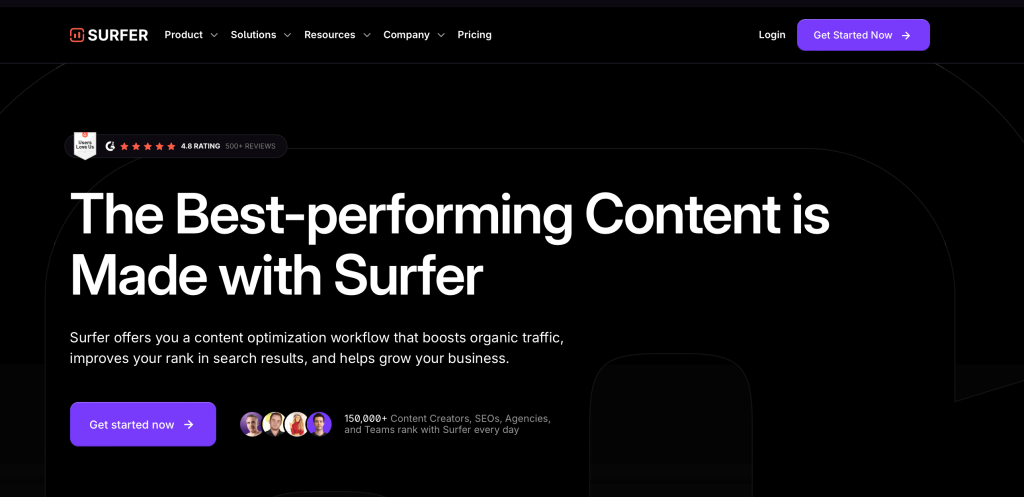
SurferSEO helps optimize content and conduct SEO analysis to improve website rankings in search engines. It is an indispensable tool for marketers, SEO specialists, and content managers. The platform assists in identifying highly competitive keywords as well as those that can drive more traffic with less competition (across different regions and countries). This is a highly professional tool for anyone looking to enhance their SEO performance and optimize website content using artificial intelligence.
MarketMuse (marketmuse.com)
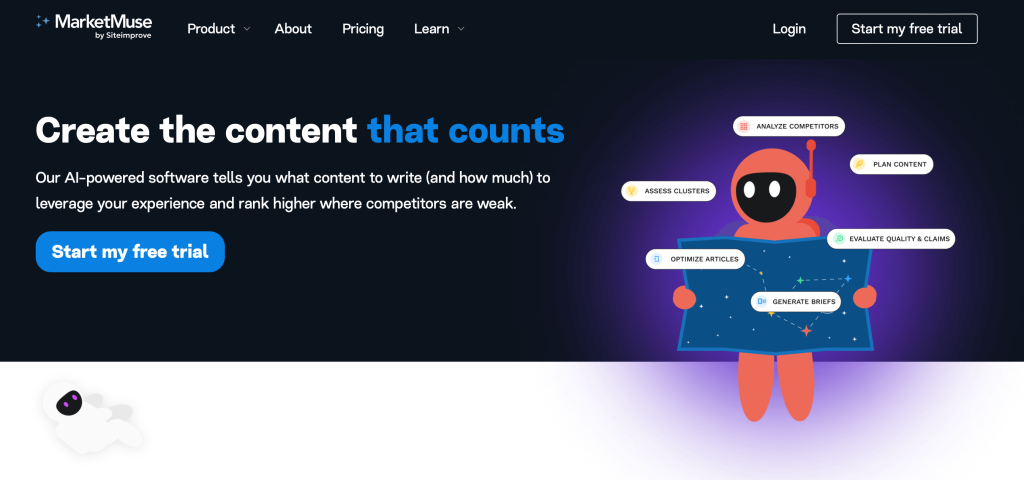
MarketMuse is a platform for content marketing and SEO optimization that uses artificial intelligence (AI) to enhance content and optimize search engine strategies. It enables the creation of high-quality, relevant content that meets search engine requirements and attracts organic traffic. MarketMuse helps create content that aligns with all search engine demands, including keywords, structure, text length, and other SEO aspects. Additionally, it allows for SEO audits of content, identifying weak points and providing recommendations to address them, improving search engine rankings.
MarketMuse offers several pricing plans: Free Trial, Pro Plan (for small teams), and Enterprise Plan (for large teams and businesses).
Semrush (semrush.com)

Semrush is a platform for SEO, digital marketing, and competitor analysis that helps developers, marketers, and SEO specialists improve the visibility of their websites in search engines and develop content strategies. A very popular feature is its competitor analysis, which examines their organic visibility in search engines, keyword usage, and strategies.
Semrush is a versatile tool that covers all aspects of SEO and digital marketing, offering powerful analytics to achieve top results in search engines.
Frase (frase.io)
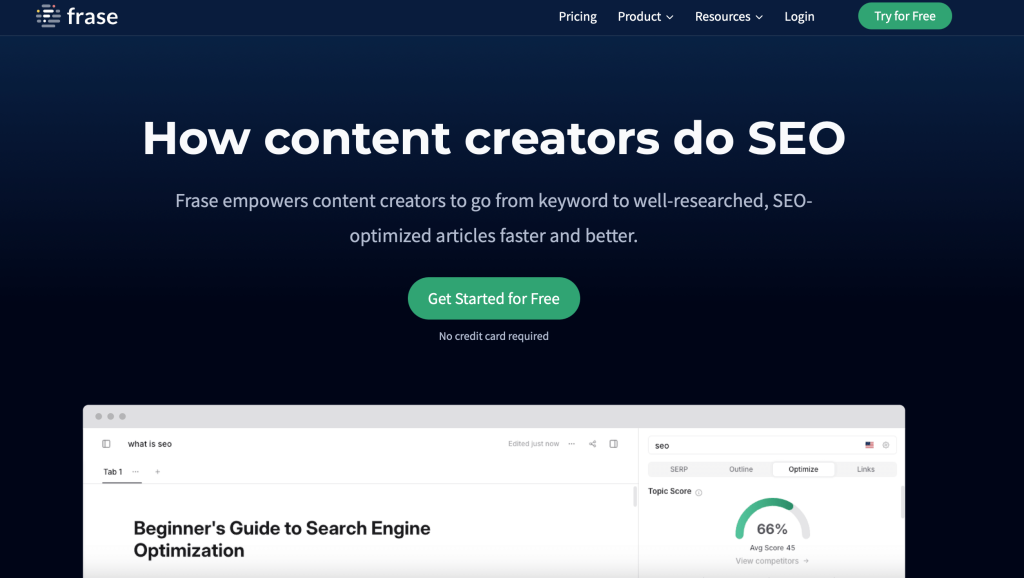
Frase is a tool that helps manage SEO and content marketing using AI-driven data to create high-quality content optimized for search engine requirements. Its primary goal is to assist businesses and marketers in creating content that enhances search engine visibility, attracts traffic, and meets user demands. Frase analyzes how content appears on Google's search results page (SERP) and provides optimization recommendations for meta tags, headlines, and descriptions to improve click-through rates (CTR).
We hope the information provided is sufficient to help you choose the tools that align with your business goals and strengthen your brand development marketing strategies.
So, you've decided that integrating AI tools is inevitable! You've chosen the tool that suits you best. What’s next?
First, we recommend starting with an evaluation of your current marketing processes.
This involves assessing your current marketing campaigns, tools, and platforms to identify which processes require automation or improvement and where AI can enhance efficiency. Consult with your team, colleagues, or other stakeholders. Look into tools that offer trial periods, so you can "test drive" them for your business before making a purchase.
Next, we recommend:
Starting with a small set of AI marketing tools that align with your business goals and needs (it’s best to choose 1–2 of the most relevant tools to avoid confusion and minimize errors).
Starting small while thinking big (it’s more important to understand how to effectively use one or two AI tools than to struggle with a lack of understanding across ten).
Experimenting and testing AI tools by trying different strategies, variations, texts, approaches, and targeting (sometimes it takes time to figure out how to achieve the best results; don’t expect quick and revolutionary changes).
Engaging your team in training right away to enhance the overall impact.
Identifying tasks that need optimization and considering automating them without hesitating to invest in paid plans.
Monitoring the performance of your AI tools (after a month, ask yourself: Is the service making the team’s work easier? Is it improving marketing activity? How exactly? Answer honestly).
Staying true to your brand’s style, character, and values (AI should enhance your business, not just adapt to market trends).
Taking risks and using creative strategies with AI tools.
What should you avoid?
Integrating a bunch of different tools and constantly switching between them (this is a direct path to chaos and lack of organization).
Making decisions without consulting your team (unless you are the only one using the chosen tool).
Cheating during the trial period (be ethical and always adhere to market economy principles; avoid using "leaked data" from services, etc.).
Neglecting data protection rules, especially for integrations (ensure compliance with GDPR, CCPA, and all applicable regulations in your region).
Relying solely on AI marketing tools to handle your tasks and processes (AI works with large datasets, but that doesn’t mean its suggestions are always the best solutions).
What if AI doesn’t perform as effectively as expected?
When there’s insufficient or inaccurate data.
When the AI model or algorithm is not suited for the specific task (or the wrong tool is selected).
When there’s a lack of understanding or consideration of context, nuances, and ambiguity in specific situations.
When ethical or legal factors are at play (e.g., privacy, discrimination, or unethical behavior).
When the task is too complex or abstract.
When social or emotional aspects play a significant role.
When a decision cannot be made without human input.
AI services for marketers are designed to simplify teamwork, not create additional problems. Choose tools that truly help you achieve your desired results.
People have always sought to optimize their work, and artificial intelligence represents an innovative breakthrough in automating tasks. AI can resolve quick queries in the best possible way, leveraging vast amounts of data. For marketers, whose tasks often involve repetitive and monotonous work, AI services can become indispensable tools, revolutionizing business processes.
By harnessing the power of artificial intelligence in 2025, marketers can work smarter, not harder, focusing on what truly matters: building connections with their audience and achieving exceptional results. This is truly a new era!
If you’re looking to streamline your workflow, automate ad performance evaluation, or create engaging content or banners, the tools highlighted in this article offer ready-made solutions for every task. Stay competitive and confident in your marketing activities!
Start by testing the tools that best align with your goals and explore how AI can enhance your approach to work. Don’t be afraid to experiment—finding the right path may take time, but the results will be worth it!
What are the advantages of using AI in marketing?
Artificial intelligence ensures:
In addition, AI services allow real-time campaign optimization, providing marketers with actionable analytics to boost ROI and make smarter decisions.
How is AI used in marketing?
What can artificial intelligence do?
In a marketer’s workflow, AI helps quickly analyze vast amounts of data, forecast trends, and personalize interactions, making campaigns more effective and tailored to individual consumer preferences.
How is artificial intelligence used in advertising?
Advertising tools aim to provide the target audience with diverse creatives for precise targeting based on their motives and needs.
Artificial intelligence is used to optimize ad targeting, automate bidding strategies, and create dynamic ad content. AI tools:
Using AI allows brands to reach the right people at the right time with the right message.
How can AI enhance marketing efficiency?
AI enhances marketing efficiency by automating many tasks.
This includes:
These automations reduce the time spent on manual processes and provide faster insights, enabling teams to quickly respond to changes in market trends and consumer behavior. AI also helps allocate resources more effectively, allowing human efforts to focus on strategic rather than routine tasks.
Can AI replace digital marketers?
While the capabilities of artificial intelligence greatly expand the scope of digital marketers' activities, it is not a full replacement. AI excels at data-driven tasks and process automation, but it lacks creativity, emotional intelligence, and strategic thinking, which are crucial to professional marketers. Instead of replacing marketers, AI acts as a powerful tool that supports them in achieving better results and focusing on higher-value activities requiring expertise and competence.
How to choose the best AI tool for my marketing strategy?
The choice of a tool depends on your goals and needs:
Cost and accessibility.
The specifics of your business (B2B, B2C, e-commerce).
Types of marketing tasks to solve (content, SEO, advertising, analytics).
Integration with your other tools (CRM, advertising platforms).
What are the main categories of AI tools for marketing?
Marketers can use a variety of services for their tasks, but they can be categorized based on specific features:
Email marketing automation (including building personalized offers).
Content creation tools (photos, videos, texts, and other materials).
SEO and data analysis (especially when working with search engines).
User experience personalization (understanding and analyzing the customer journey from need awareness to purchase decision).
Advertising tools and optimization (automating workflows in services and implementing data).
Social media analysis and development (planning, content generation, and creating promotion strategies).